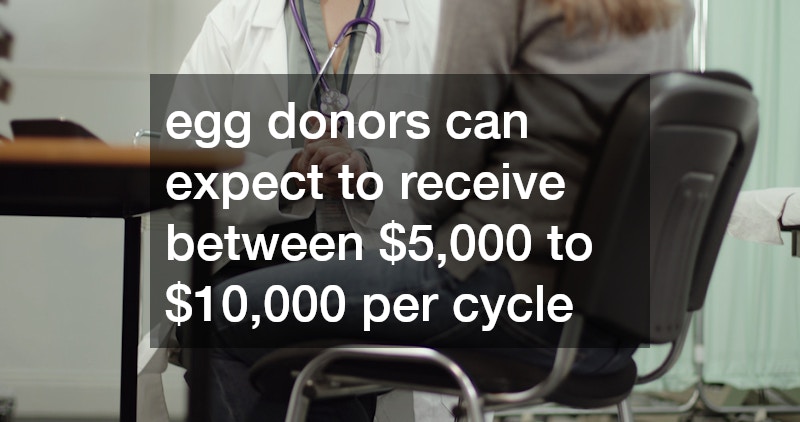Egg donation is a life-changing and generous way to help individuals or couples who are unable to conceive naturally. It involves a woman donating her eggs to help others achieve parenthood. While the process may sound complex, many women choose to become egg donors for various reasons, whether it be for the compensation, the opportunity to help others, or the desire to make a difference in someone’s life. If you’re wondering, ” Can I sell my eggs?” it’s natural to have questions. In this article, we’ll address some of the most common FAQs about selling your eggs.
1. What is egg donation, and how does it work?
Egg donation is the process in which a woman donates her eggs to another person or couple who cannot conceive on their own. The donor’s eggs are fertilized by sperm in a laboratory (via in vitro fertilization, or IVF), and the resulting embryos are then transferred into the intended mother’s uterus or a surrogate.
The process begins with a screening phase to ensure that you are healthy enough to donate eggs. Afterward, you will undergo ovarian stimulation, which involves hormone injections to increase egg production. Once your eggs are mature, they are retrieved through a minor surgical procedure, and the eggs are then fertilized. The donor receives compensation for their time, effort, and the physical process involved.
2. Am I eligible to become an egg donor?
Not every woman is eligible to donate eggs. To become an egg donor, you typically must meet certain medical, psychological, and legal requirements. The most common eligibility criteria for egg donors include:
Age: Most egg donation agencies require that you be between the ages of 21 and 30. Women in this age range are more likely to have healthy, viable eggs.
Good health: You must be in good physical health, with a normal reproductive system and no chronic health conditions such as diabetes or heart disease.
No history of serious reproductive complications: Women who have had complications such as recurrent miscarriages, irregular periods, or difficulty getting pregnant may not be eligible.
Emotional stability: Because egg donation involves a significant emotional commitment, many agencies require psychological evaluations to assess your mental and emotional health.
Non-smoking and healthy lifestyle: Donors are typically required to be non-smokers and to have a healthy lifestyle, including maintaining a normal weight and avoiding drug use.
3. How does the egg donation process work?
The egg donation process typically unfolds in the following steps:
Initial consultation and screening: After applying to become a donor, you’ll undergo a screening process to evaluate your health, family history, and lifestyle. This usually involves medical tests, blood work, genetic screening, and psychological assessments.
Ovarian stimulation: Once you’re approved as a donor, you’ll begin a cycle of hormone injections to stimulate your ovaries to produce multiple eggs. This typically takes about 10-14 days. During this period, you will visit the fertility clinic for regular ultrasounds and blood tests to monitor your progress.
Egg retrieval: Once your eggs are mature, a minor surgical procedure will be performed under sedation to retrieve the eggs. The procedure takes about 20-30 minutes and is usually done via the vagina, using a needle to aspirate the eggs from your ovaries.
Post-retrieval care: After the retrieval, you may experience some discomfort, cramping, or bloating. The fertility clinic will provide instructions for recovery, and you should avoid strenuous physical activity for a short period after the procedure.
4. How much do I get paid for donating my eggs?
Egg donors are typically compensated for their time, effort, and the physical process involved. Compensation varies depending on factors such as the fertility clinic, the donor’s experience, and geographical location. On average, egg donors can expect to receive between $5,000 to $10,000 per cycle. However, some experienced donors or those willing to donate to specific recipients may be compensated more.
It’s important to note that compensation is not based on the number of eggs retrieved, but rather for the time, commitment, and medical procedures involved. Keep in mind that compensation is subject to tax, and donors should consult a tax professional for advice on how to handle this income.
5. Are there risks associated with egg donation?
While egg donation is generally considered safe, there are risks involved. The primary medical risk is ovarian hyperstimulation syndrome (OHSS), which can occur when the ovaries become overstimulated by the hormones used to produce multiple eggs. Symptoms of OHSS may include abdominal pain, bloating, and nausea, and in severe cases, it can require hospitalization.
Other risks include infection from the egg retrieval procedure and emotional impact from the experience. It is essential to discuss any concerns with your fertility clinic before deciding to donate eggs. You should also be aware of potential long-term health effects, although studies show no significant long-term risks for egg donors.
6. What happens to the eggs after donation?
After the eggs are retrieved, they are fertilized with sperm in a laboratory setting. The resulting embryos are typically monitored for a few days to assess their development, and the best-quality embryos are selected for transfer to the intended mother’s or a surrogate’s uterus. The remaining embryos may be frozen for future use or discarded, depending on the recipient’s wishes.
As a donor, you typically have no legal rights to the embryos, and you will not have any involvement in their future. Some egg donors may want to know the outcome of their donation, but this is usually up to the intended parents to share, depending on whether the donation was anonymous or open.
7. Will my identity be kept anonymous?
Egg donation can be either anonymous or open (where the donor agrees to share personal information with the recipient). Most egg donation arrangements are anonymous, and intended parents typically do not know the identity of the donor. However, some recipients may want to know more about the donor’s background, and in these cases, a semi-open or open donation may be an option, where limited information can be exchanged.
In cases of anonymous donation, the donor’s identity is kept confidential, and intended parents typically receive only basic information such as age, medical history, and education level.
8. What happens if I change my mind after agreeing to donate?
It’s essential to carefully consider the decision to donate your eggs, as it is a significant commitment. However, if you change your mind at any point before the egg retrieval, you can back out of the process. Most fertility clinics and agencies are understanding of these decisions, especially if made early in the process. Once the egg retrieval occurs, however, it is much more complicated, as you have already undergone medical procedures, and the eggs are no longer your property.
If you choose to back out during the hormonal stimulation phase or before egg retrieval, it is crucial to discuss your concerns with the fertility clinic so they can offer advice and support.
Egg donation is a life-changing experience that allows you to help others build their families. Understanding the process, the potential risks, and the compensation involved can help you make an informed decision about whether egg donation is right for you. By donating your eggs, you are not only providing a valuable gift to someone in need, but you’re also opening up new possibilities for families struggling with infertility.






